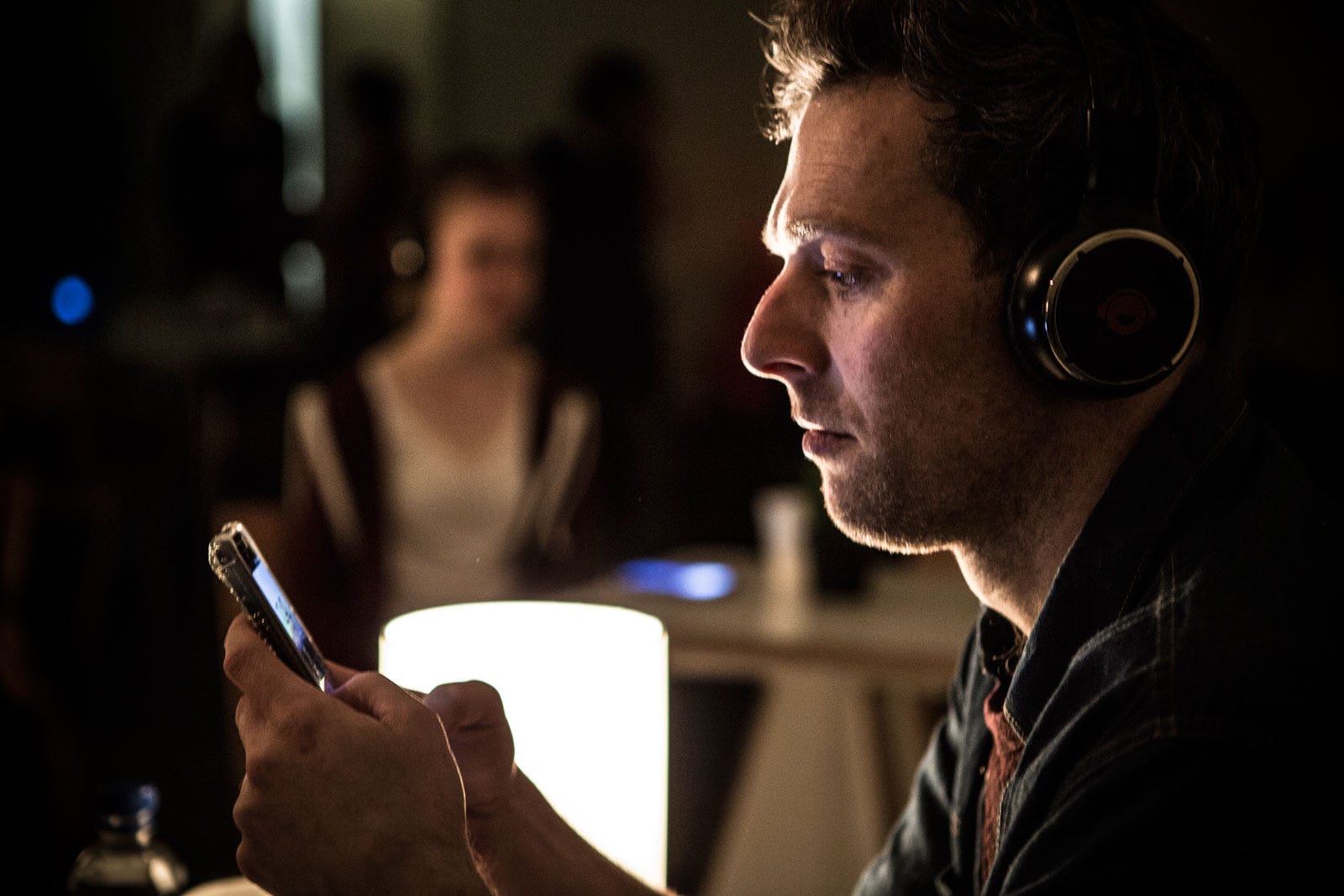‘User Not Found’ Thoughtfully Explores Our Digital Legacies (The NoPro Review)
Pondering the bits we leave behind in Dante or Die’s intimate production


A man gestures to me, sitting cozied up in a corner with my cup of tea.
“And Margaret over here likes a quiet corner, just like me.”
I panic. Is he talking about me? How could he possibly know that to be true?
My name’s not “Margaret” (well, my middle name is… but still) but he definitely gestured at me.
Of course he’s not talking about “me,” well, he’s not talking about the real me anyway, he doesn’t even know me. The real me is just a placeholder, a body in space. He’s talking about the idea of me. It’s people watching, really, and we’re all just ideas of who we could be.
User Not Found is an immersive theatre production performed in a cafe which uses technology to communicate an intimate look into one man’s journey through love, loss, and the impact our digital legacies might (or might not) have on those around us. Set in the cozy Greene Grape Annex cafe in downtown Brooklyn, audience members sit at communal tables and are able to chat over tea, coffee, wine, and snacks before the performance. Everyone is given a pair of wireless headphones and a smartphone. We are instructed to put the headphones on once we see our phones flashing with a headphone symbol. Soon, the performance begins. We hear someone speaking, but it takes me a moment to realize that the person speaking, Terry, is sitting at the end of my table, just like the rest of us. He is another “anybody” in the cafe until this moment.

Terry speaks out loud, but we hear him through our headphones, layered with additional soundscapes like ambient cafe noise and other atmospheric audio that help tell key moments of the story. As Terry introduces himself, we also see our phones light up, mimicking what he is experiencing on his own phone screen throughout the piece. Suddenly, we go back in time, flipping through the calendar via the time stamp on the screen saver of the phone, with days and minutes racing backwards. We see a flood of texts and emails from concerned friends, acquaintances, and family members.They offer condolences and are all there for him if they need to talk. They’ve all heard some news that Terry hasn’t: Luka is dead. A passing thought pops into my head. Losing a loved one will never be easy, but at least now we can simply shoot a text back to the concerned party instead of having to go through the pain of a phone conversation over and over again each time someone calls to offer their condolences.
Get Allie Marotta’s stories in your inbox
Join Medium for free to get updates from this writer.
SubscribeSubscribe
It turns out Terry has been deemed the executor of Luka’s digital presence: all social media profiles, email, texts, and the like. He must decide whether to preserve these for friends and relatives to use as a remembrance or to wipe Luka from the digital world. What proceeds is a thought-provoking and heart wrenching account of loss, and a compelling investigation of how we choose to preserve the memory of a person after they’re gone. In consideration of the massive impact that social media has on many people these days, the additional aspect of managing a deceased person’s digital life is a fairly uncharted responsibility in the face of loss. One particular standout moment of the piece sparks from Terry’s initial sifting through of Luka’s Twitter account. As Terry scrolls through the Twitter feed, he searches for signs of their life together. What did Luka tweet on the day they first met, what about that time they went to the farmer’s market, what about the day they parted, and on and on. It doesn’t read as self-obsessed, but rather a desperate, inconsolable almost, action, as Terry seeks a representation of a shred of the connection they once shared. It’s a sense of comfort that could only come from something left behind, just for you, by the person in question. Kind of like when you call someone on the phone every now and then, even though they’ll never pick up, but you call just to hear their voice on the voicemail greeting. It becomes a treasure of time past to return to.
I left User Not Found wondering what my social media presence says about me and my life. I tweet about my friends and family with reckless abandon, documenting funny moments, choice quotes, and strange encounters. But do these posts matter? I’ll get a few likes or a retweet now and again, but it’s all in passing. I probably won’t remember it by next week. In the future, what will it all mean? Will my friends even remember what my vague 280 character reference from six years ago was all about? I guess that part doesn’t matter so much. What does matter, though, what the comforting aspect of it all is, is that it’s a physical representation of a thought you once had about someone. It’s solid and undeniable. It says, I was thinking of you when I wrote that. And in a world where we aren’t quick to offer up our own vulnerability in public, that seems special.
The structure of the piece works really well. Setting User Not Found in a cafe is clearly casts the audience as observer without making them feel entirely on the outside. What we witness is highly intimate, which — when juxtaposed with the fictionalized public setting — creates a sense of solidarity. But somehow we are each still on our own. Much like the people populating a real cafe, none of us really know anything about each other, but because of Terry, we’re all experiencing the same thing together. To be able to do so is a privilege. It evokes the same feeling of when strangers band together in the face of adversity, like when the power went out in NYC this past summer and pedestrians began directing traffic in lieu of traffic lights. It makes you realize both how much power we have collectively and yet how small we are at the same time.
In User Not Found, the use of headphones also mimics tables full of people using the cafe as their “office”; they also provide a layer of anonymity that is integral to making this experience palatable without it being too uncomfortable. The smartphone is a wonderful tool to create an intense layer of intimacy between us and Terry. It ends up being a huge contribution to the feeling of immersion in the piece. Between hearing Terry’s thoughts in my ears and having his texts and calls on my screen, it was easy to remove my layer of “self” and to allow myself to become a vehicle for the piece. I felt fully engaged without actively participating, which is a difficult balance to find in this nature of work. The show maintains the constructs of theatricality, with light design, sound design, and blocking working to guide our attention and create a world as opposed to letting it unfold in the “real world,” which helps the audience’s suspension of disbelief.

The experience I had at User Not Found impacted me greatly. I am left wondering about the implications of my own presence on social media, and also feeling a bit like I’ve missed out on something. Now, I wonder how my grief might have been changed if my departed loved ones in the past had left something behind for me. As lovely as it would be to have documentation of our lives together from their point of view, I suppose it’s for the best. I feel like we still don’t know how to best navigate the world of technology or the implications that new advances in tech might have down the line. I’m happy enough with a voicemail greeting for now.
And no, I didn’t tweet about my time at User Not Found. But I suppose this review will exist as attribution to my experience and the thoughts I had there. This, too, will be a part of my digital legacy that I will inevitably leave behind one day. My use of social media and technology won’t change at this time, but what has changed is how I view the use of social media by my friends and loved ones. I am beginning to look for the same thing Terry searched for, moments that seem trivial now, the same moments that could contain sentimental nuance later on. With this in mind, I do think if I were to change my behavior to craft a specific social media experience for my loved ones, it would end up being inauthentic, and that would be missing the point entirely. Your legacy is who you were, not what you want everyone to see after you’re gone, so I’ll let it be exactly that, for now.
User Not Found has concluded its run at BAM.
NoPro is a labor of love made possible by our generous Patreon backers. Join them today!
In addition to the No Proscenium web site, our podcast, and our newsletters, you can find NoPro on Twitter, Facebook, YouTube, Instagram, in the Facebook community Everything Immersive, and on our Slack forum.
Office facilities provided by Thymele Arts, in Los Angeles, CA.